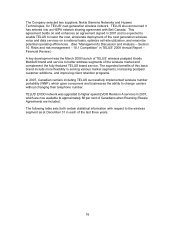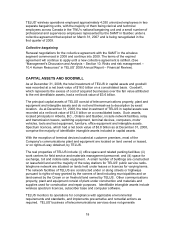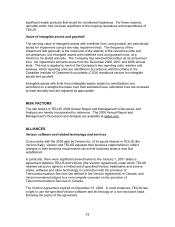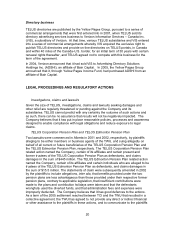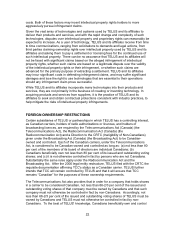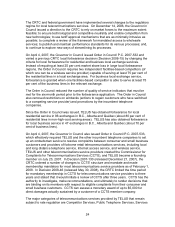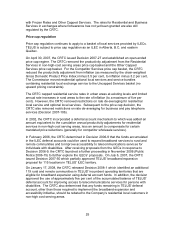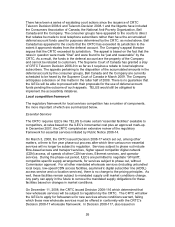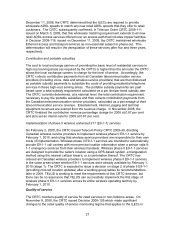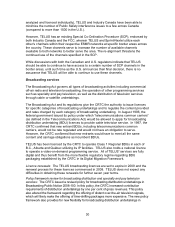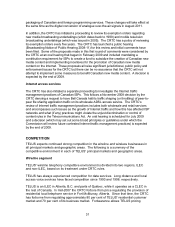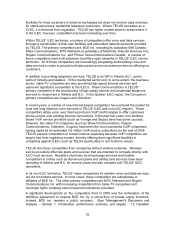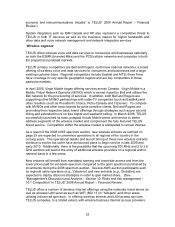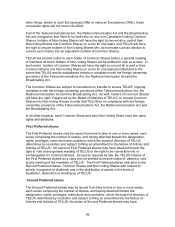Telus 2008 Annual Report Download - page 26
Download and view the complete annual report
Please find page 26 of the 2008 Telus annual report below. You can navigate through the pages in the report by either clicking on the pages listed below, or by using the keyword search tool below to find specific information within the annual report.There have been a series of escalating court actions since the issuance of CRTC
Telecom Decision 2006-9 and Telecom Decision 2008-1 and the litigants have included
the Consumers Association of Canada, the National Anti-Poverty Organization, Bell
Canada and the Company. The consumer groups have appealed to the courts to direct
that rebates be made to local telephone subscribers rather than have the accumulated
deferral account funds used for purposes determined by the CRTC, as noted above. Bell
Canada has appealed to the courts that the CRTC has exceeded its jurisdiction to the
extent it approved rebates from the deferral account. The Company’s appeal likewise
argues that the CRTC exceeded its jurisdiction. The appeal is based on the fact that the
rates in question were made “final” and were found to be “just and reasonable” by the
CRTC. As a result, the funds in the deferral account are the property of the Company
and cannot be rebated to customers. The Supreme Court of Canada has granted a stay
of CRTC Telecom Decision 2006-9 in so far as it requires a rebate to local telephone
subscribers. The appeals pertaining to the disposition of the accumulated amounts in the
deferral account by the consumer groups, Bell Canada and the Company are currently
scheduled to be heard by the Supreme Court of Canada in March 2009. The Company
anticipates a decision on this matter in the latter half of 2009. There is no guarantee that
the ILECs will be able to proceed with their proposals for the use of deferral account
funds pending the outcome of such appeals. TELUS would still be obligated to
implement the accessibility initiatives.
Local competition framework
The regulatory framework for local services competition has a number of components,
the more important of which are summarized below.
Essential Services
The CRTC requires ILECs like TELUS to make certain “essential facilities” available to
competitors, at rates based on the ILEC’s incremental cost plus an approved mark-up.
In December 2007, the CRTC completed an extensive review of the regulatory
framework for essential services initiated by Public Notice 2006-14.
On March 3, 2008, the CRTC issued Decision 2008-17 which set out, among other
matters, a three to five year phase-out process after which time various non-essential
services will no longer be subject to regulation. Services subject to phase out include
fibre-based access and transport services, higher speed competitor digital network
(CDN) access, all speeds of other CDN services, Ethernet services, and operator
services. During the phase-out period, ILECs are permitted to negotiate “off-tariff”,
competitor-specific supply arrangements, for services subject to phase out, without
Commission approval. For all other mandated wholesale services (including unbundled
local loops, low-speed CDN access facilities, asymmetric digital subscriber line (ADSL)
access service and co-location services), there is no change to the pricing principles. As
well, these facilities remain subject to mandated supply until market conditions change.
Any party can apply in the future to remove the mandated supply obligations for these
facilities based on changes in market conditions.
On December 11, 2008, the CRTC issued Decision 2008-116 which determined that
new wholesale services will be subject to regulation by the CRTC. The CRTC will allow
the ILECs to apply for forbearance for new services where conditions warrant, failing
which these new wholesale services must be offered in conformity with the CRTC’s
Decision 2008-17 wholesale framework. In Decision 2008-117, also issued on
26


